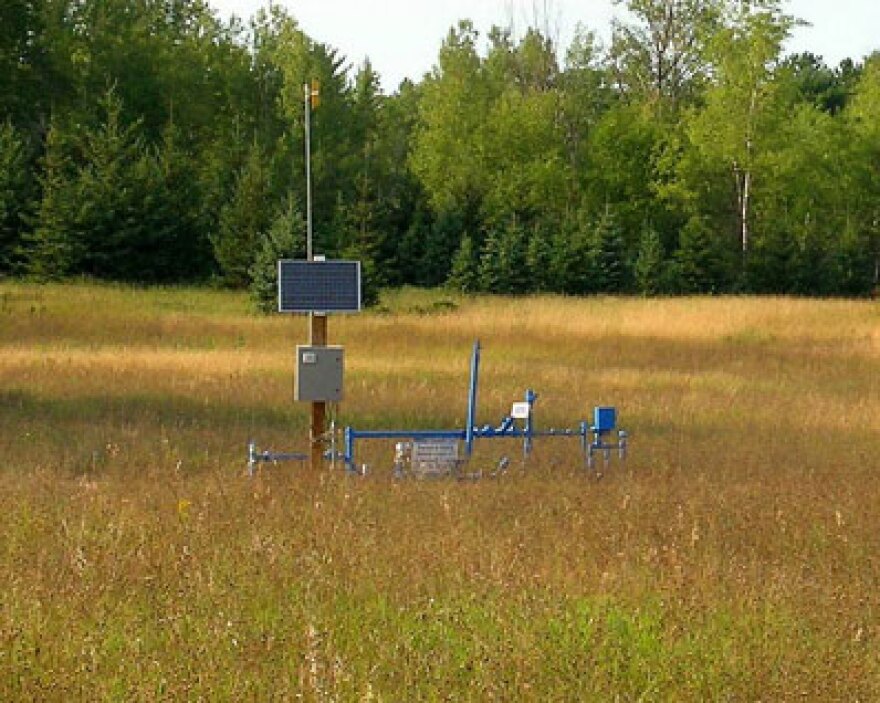http://stream.publicbroadcasting.net/production/mp3/michigan/local-michigan-926093.mp3
Environmentalists are concerned drilling for new sources of natural gas in Michigan could contaminate water. They're basing that on reports from other states that blame a new method of drilling for contaminating their water.
This new kind of drilling is called horizontal hydraulic fracturing. Until recently in Michigan, it was only used in vertical wells. Drill down, pump water, sand and chemicals at high pressure into a layer of shale, fracture it and release the natural gas trapped there.
This new method drills down much deeper, then the drill head is turned, and drilling continues horizontally a mile or more, fracturing the shale along the way to release gas.
One exploratory well in Michigan's Misaukee County has been drilled. Another in Cheboygan County is underway by a Canadian gas company, EnCana Corporation.
HOW HYDRAULIC FRACTURING WORKS (Graphic by Al Granberg courtesy of ProPublica)
Michigan regulators think it's safe.
"We don't see a concern with the fracturing itself. Because of the physics involved, those fractures don't propogate upward into connection with fresh water aquifers," says Hal Fitch, head of the Department of Natural Resources and Environment's Geological Survey Division.
Hydraulic fracturing proponents say the gas is captured in a shale layer so far down it couldn't possibly migrate through the thousands of feet of bedrock to reach the water table far above, but there's been little or no independent scientific study as to whether that's really the case.
Brian Hampton is a geologist at Michigan State University. He believes it's highly unlikely gas, or the fluid used for fracturing could cause a problem deep underground, but it could cause a problem closer to the surface.
"As it's coming back up to the surface, if it gets anywhere outside of the well it has the potential of contaminating some of water sources sitting much higher in the rock formations," says Hampton.
The fracturing fluid, that water, sand and chemical mix is first pumped down under lots of pressure, then some of it is removed. The weak link is the well casing closer to the surface. If that casing leaks, the fracturing fluid or the natural gas or both could get into the water table, contaminating wells or surface water. The fracking fluid includes a chemical mix of any of 569 chemicals, but we don't know how much or exactly which chemicals. The companies say they have to keep the formulas secret because there's so much competition.
Hal Fitch with DNRE says the companies do post a list of the class of chemicals that are used and the hazards they pose, but the Michigan Department of Natural Resources and the Environment won't learn what's actually in fracking fluid unless there's a problem.
"We do have the authority to find out exactly what those chemicals were that were added to the solution, what the concentrations were and we're going to be looking for those as far as clean-up," says Fitch.
The U.S. Environmental Protection Agency has asked the companies that make the fracking fluids to voluntarily reveal what's in them. We're waiting for the responses. Wyoming is now demanding to know before that state will allow drilling. Michigan is not.
Doug Houck is the spokesman for the one company that has used horizontal fracking in Michigan, EnCana. He says existing regulations will protect the environment.
"It is a very strong regulatory regime in the state of Michigan."
Lester Graham:" With that, can you assure the people of Michigan that there will be no accidents, no spills, no contamination of groundwater or surface water?"
Doug Houck "Well, as in any industrial process or really any kind of process in life in general, there are no guarantees. What we can say is that we will take every measure to ensure that we operate safely, that this is done in a professional way and that we meet and exceed the regulations that are in place."
But with incidents and reports of water contamination in other states where horizontal fracking is already being used, environmentalists wonder if Michigan's regulations are strict enough.
More Resources
ProPublica's vast coverage of horizontal fracking
Michigan DNRE paper on horizontal fracking (pdf)
A second Michigan DNRE paper on horizontal fracking (pdf)
Michigan Environmental Council on Fracking
Michigan Association of Professional Landmen
Encana Corporation
Michigan Oil and Gas Association







